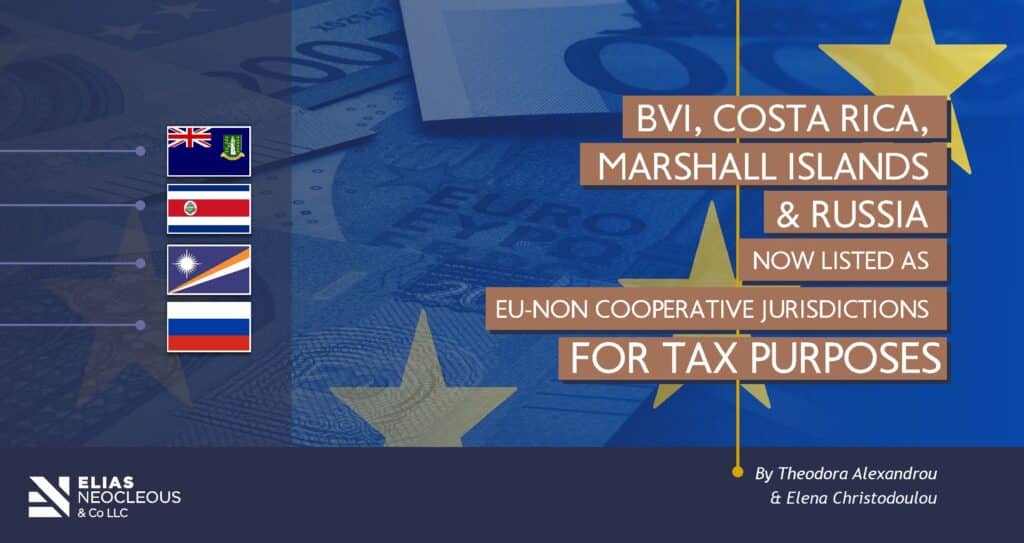On 14 February 2023, the Council of the European Union (“EU”) announced that British Virgin Islands (“BVI”), Costa Rica, Marshall Islands and Russia have been added to the list of EU non-cooperative jurisdictions for tax purposes (known as the “blacklist”). The blacklist now consists of the following 16 jurisdictions:
| American Samoa | Fiji | Samoa |
| Anguilla | Guam | Trinidad and Tobago |
| Bahamas | Marshall Islands | Turks and Caicos Islands |
| British Virgin Islands | Palau | US Virgin Islands |
| Costa Rica | Panama | Vanuatu |
| Russia |
The blacklist includes jurisdictions that have failed to (i) engage in a constructive dialogue with the EU on tax governance, (ii) impose and comply with rules aiming at good tax governance including fair taxation and tax transparency, and (iii) implement international standards designed to prevent tax base erosion and profit shifting.
This expansion of the blacklist triggers compliance, tax and reporting related considerations in respect of individuals and organisations with links to the newly listed countries. This article elaborates on tax implications that may arise and which should be reviewed by clients in line with their structures.
Tax considerations
Withholding Tax (“WHT”)
Cyprus only imposes WHTs on outbound payments of dividend, interest and royalties to jurisdictions included in the blacklist. The types of entities being affected are the following:
- companies registered in a jurisdiction within the blacklist; and
- companies that are incorporated or registered in any jurisdiction included in the blacklist that are also not considered to be tax resident in another jurisdiction not included in the said list.
WHT on dividend payments
Although Cyprus does not generally impose WHT on payments to non-Cyprus residents, as of 31 December 2022, dividends paid to companies included within the aforementioned categories will be subject to WHT of 17% if any of the following conditions are met:
- The company has more than 50% of the voting rights of the Cyprus resident company issuing the dividend; or
- The company owns more than 50% of the capital of the Cyprus resident company issuing the dividend; or
- The company is entitled to receive more than 50% of the profits generated by the Cyprus resident company.
Further to the above, any non-Cyprus individual tax resident will not be eligible to a refund of WHT taken under ‘deemed dividend’ distribution rules if that person is tax resident in one of the blacklisted jurisdictions.
WHT on interest payments
From 31 December 2022, passive interest received by or credited to a company included in the blacklist will be subject to a 30% WHT.
WHT on royalty payments
A 10% WHT is levied on outbound royalty payments to non-tax residents (individual or corporate) who are not engaged in business in Cyprus. This applies only to royalty income derived in Cyprus for rights granted for use in Cyprus. From 31 December 2022, for companies falling within the scope of the aforementioned, a 10% WHT will also apply to the income received from the exercise of rights granted for use outside of Cyprus.
DAC6
Apart from WHT there are also reporting implications under DAC6. According to hallmark C(1)(b)(ii), where there is an arrangement that involves deductible cross border payments which is made between two or more associated entities and the recipient is a tax resident in one of the blacklisted jurisdictions, then a reporting obligation arises. This obligation lies with the intermediary (irrespective of whether the main benefit test is met or not). This applies only to actual amounts charged and paid and used as tax deductible expenses.
EU Public Country – by Country reporting rules
Large multinational groups operating in the EU and exceeding certain size thresholds, will have to disclose information on their tax affairs for two consecutive years if any company within the group is registered in any of the blacklisted jurisdictions.
As the EU public Country-by-Country Reporting directive (CbC) is yet to be transposed into domestic law (deadline June 22, 2023), there are currently no active reporting obligations under CbC, but this is something professionals should keep monitoring.
The Elias Neocleous & Co LLC dedicated Tax Planning and Advanced Business Structuring Department stands ready to assist clients with navigating this new development. It can also offer advice on how and to what extent this development may affect the status of the clients connected to the newly listed high-risk jurisdictions and address potential legal, corporate and tax needs as they may arise in a manner that satisfies international tax compliance and acceptance standards. For more information, please contact Theodora Alexandrou or Elena Christodoulou.


